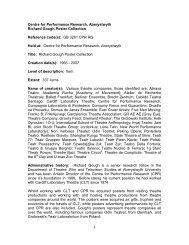Research Matters 16 - Aberystwyth University
Research Matters 16 - Aberystwyth University
Research Matters 16 - Aberystwyth University
Create successful ePaper yourself
Turn your PDF publications into a flip-book with our unique Google optimized e-Paper software.
we’re asking the candidate to<br />
demonstrate its strengths.<br />
Other questions can include asking<br />
about the nature of the contribution the<br />
thesis makes to the field, why a<br />
particular methodology or text was<br />
selected, and even—something learnt<br />
from my own external examiner—<br />
picking up on rhetorical nuances.<br />
Being asked ‘Do you feel that your use<br />
of the paralogical word ‘suggests’<br />
weakened your argument?’ was<br />
intimidating, but it demonstrated the<br />
level of scrutiny that an examiner<br />
brings to the thesis. The purpose of the<br />
viva is, after all, to examine the entire<br />
thesis, and such attention to detail is<br />
invaluable later in re-writing the thesis<br />
as a monograph.<br />
Finally, the act of sending the<br />
candidate out at the conclusion of the<br />
viva may often seem unnecessary, but<br />
it allows the examiners to confirm (or<br />
amend) their initial recommendations<br />
and gives them the opportunity to<br />
agree formal comments on the<br />
candidate’s viva. Interestingly, in the<br />
institution I examined in, this period<br />
also included the chair commenting<br />
upon the conduct of the examination.<br />
That is, both the internal and external<br />
examiners had their viva performance<br />
commented upon. This ensured that<br />
nothing untoward had occurred, and<br />
served to reassure me too.<br />
After the viva<br />
One of the most pleasant aspects of<br />
being an external examiner is the time<br />
after the viva (assuming all has gone<br />
well). For me, the purpose of the<br />
external is to both examine the project<br />
and offer the candidate advice for the<br />
future. I imagine I’ll be contacted in<br />
due course regarding a monograph<br />
deriving from project, and expect to act<br />
as a referee for both academic jobs and<br />
6<br />
postdoctoral funding applications. In<br />
order to do be able to do this<br />
knowledgeably, and after an hour-anda-half<br />
examination, post-viva ‘coffee<br />
and cakes’ or an evening meal is a<br />
must, to informally chat with both<br />
candidate and supervisors. As much as<br />
this is an opportunity to catch up with<br />
colleagues in the field, however, it is<br />
vital to remember, as Jeremy Hardy<br />
says, ‘It’s not about you.’ This is the<br />
candidate’s day, and although externals<br />
are treated like royalty (albeit not like<br />
Charles I or Edward II), we’re only<br />
there because of the candidates; I think<br />
it’s worth getting to know them a little.<br />
Acting as an external examiner carries<br />
responsibilities to both the discipline<br />
and the candidate, and it takes time,<br />
care, and more time and care. Yet were<br />
anybody to ask me to do it again, my<br />
answer would be simple: ‘Yes.’<br />
Will Slocombe<br />
Will Slocombe is Lecturer in Twentieth-<br />
Century Literature at <strong>Aberystwyth</strong> <strong>University</strong>.<br />
His research interests are diverse, and he is<br />
always happy to discuss issues such as the<br />
above. He thanks all the relevant parties at the<br />
institution in which he examined for making<br />
his first external examination so<br />
straightforward.<br />
Surviving your Viva<br />
(and Mock-Viva)<br />
Asked to provide a report<br />
on one’s Viva Voce<br />
barely a month after the<br />
actual event, I suppose<br />
the first response is a<br />
faint feeling of nausea,<br />
intermixed curiously with pride. There<br />
is no getting away from the fact that<br />
the impending viva is alarming; many



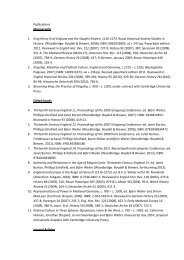
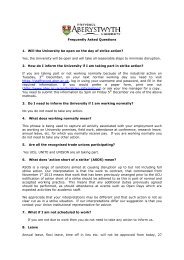

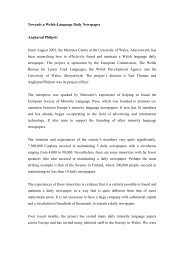
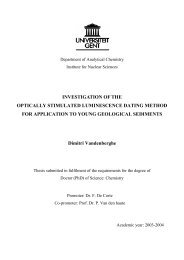
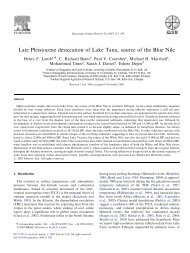
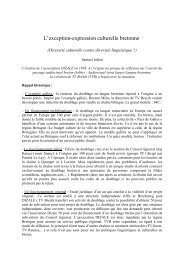
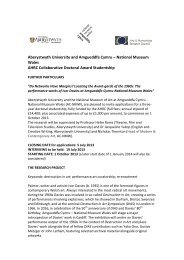
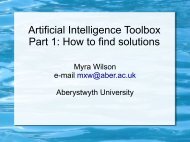
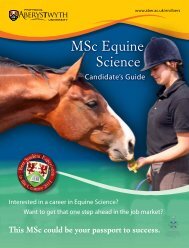
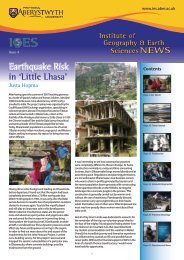
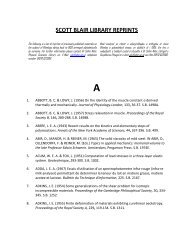
![[pdf] the council - Aberystwyth University](https://img.yumpu.com/8200062/1/184x260/pdf-the-council-aberystwyth-university.jpg?quality=85)
